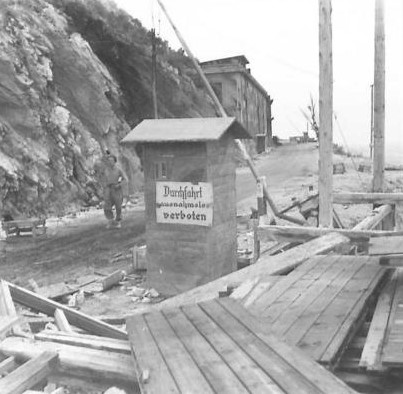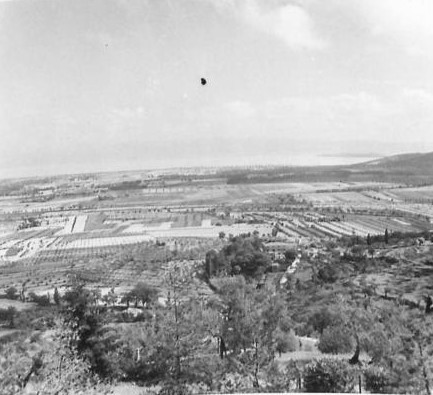San Oreste
“From now on, the Germans started to withdraw. They fought a series of rearguard actions and we followed them up but they were never to stand again really until Lake Trasimene. I remember in the advance driving through Rome in the jeep but I never saw Rome; I never got the chance to get back there. We were continuing forward. I’m not going to go into all the details about what happened now because it is very sketchy in my mind but I well remember one occasion when we were in an Italian village – I think it was Ripi – and we got there about darkness and everybody thought we going to be there for the night and we settled down but, unfortunately, the men had found a cellar with a barrel of vino and the whole company set to on the vino and at about three o’clock in the morning I got an order for H Company to move out.
Well now, H Company was not I can tell you in good condition. They’d really imbibed and when I told my sergeant major – Sergeant Major Long – to get them moving he was just as bad as the rest of them. I got hold of the officers and with great difficulty we got them moving again. Now, Sergeant-Major Long, had I reported this to John Horsfall, might have been court martialled but he had done so well throughout our advances that I decided to turn a blind eye. However, I told him that if he ever did a thing like this again, I wouldn’t have the slightest hesitation in court-martialling him. You cannot drink when you are in action. I always remember this little incident.

Now, another incident I would like to mention. When we were near a place called Orvieto, we came to where Kesselring had his headquarters. This was built into the side of a mountain and I was given the job of guarding this headquarters to stop looters coming along. It was a great opportunity to re-stock the company headquarters with crockery and wine etc. I will never forget this headquarters of Kesselring; there were panelled rooms for his staff officers built into the mountain and there were huge cages where he kept his transport – absolutely unbelievable and it wouldn’t have mattered what you did there in the way of bombing. Had he been able to stay there, he could not have been shifted out of it but, of course, he was long gone by now.
There was an Italian village near this headquarters of his and I went there one evening and I was greeted by the It-ies. They were all smiles and I said, “I suppose you were just the same when the Germans were here.” They said to me that no German soldiers ever set foot in this village This shows you the discipline that the German army had; I’m quite certain if it had been us, some of our soldiers would have been up in that village.
Sanfatucchio
Well, we now moved onto Lake Trasimene. This is where the Germans finally decided to make another stand. There had been talk of a crossing of the lake behind their positions but that was decided against. By now, I was beginning to get petty weary and I think John Horsfall realised this and he said he was going to leave me as reserve company for the battle at Lake Trasimene.

We moved up in our vehicles, I remember, and disembarked and then we started another attack. Now, on this occasion, there was a lot of cornfields and the Germans were positioned in packets in the cornfields as opposed to farmhouses – a different technique altogether. I can remember advancing through one of the cornfields and a message came from one of my platoon commanders in front to say that they were held up by German fire and I was bobbing up with my field glasses to try and find out where the fire was coming from when there was a loud explosion in my headquarters. This was actually a stick grenade that had been thrown by some Germans that were near our position. I got hit in the leg, one of my platoon commanders was wounded, my company sergeant major was wounded and the second in command, Bill Craig, had to come up and take over command. We went back to the First Aid Post.
By this time I was beginning to come to the end of my tether. Three things can happen to you in the war; you either get killed or you get wounded and you go back for a bit of a rest and then come back for more or you go on until you become what – we had an expression in Italy of becoming ‘bomb-happy’. And I was very rapidly approaching this stage. I had commanded H Company from Termoli until Lake Trasimene, I suppose a bit less a year. I hadn’t missed a battle. I would have liked to have done more but I think every man has his limit. Some may have more, can last longer than others, but it entirely depends on the individual.
My wound, although not serious, meant that I had to go back and I was flown back to hospital in Bari where I remained for a period and then eventually I was discharged from hospital. I was downgraded and therefore my days with the Irish Brigade were finished. However, I was given a further job, which I think might have been some use and that was to help train the Italians, The Gruppi Cremona, they required training majors of some experience and, rather than hanging about in a transit camp at Caserta, I offered my services to Brian Webb-Carter of the Duke of Wellington’s Regiment, who was the G1 of the Gruppi Cremona Division, to go to him and help train the Italians.
I haven’t got time now to go into the details of the time I had with the Gruppi Cremona but we did move up into the line with them on the Senio and I can assure you that one month with the Italians in the line was the equivalent to about a year with the Irish Brigade. By then, I wasn’t getting any better and I was evacuated to hospital near Naples where I met Nancy, my future wife. Nancy had been doing a tremendous job with the Red Cross in Italy and I remember when I first met her, seeing how good she was. She was terribly good tending to the men and not only was she terribly good tending to the men but she became terribly good eventually in tending to me and I think she helped me to eventually recover and that was to take much longer than I thought. I was eventually evacuated back to the UK and took quite a while to recover and then Nancy came back and we got married and I was a lucky man to have found her.”